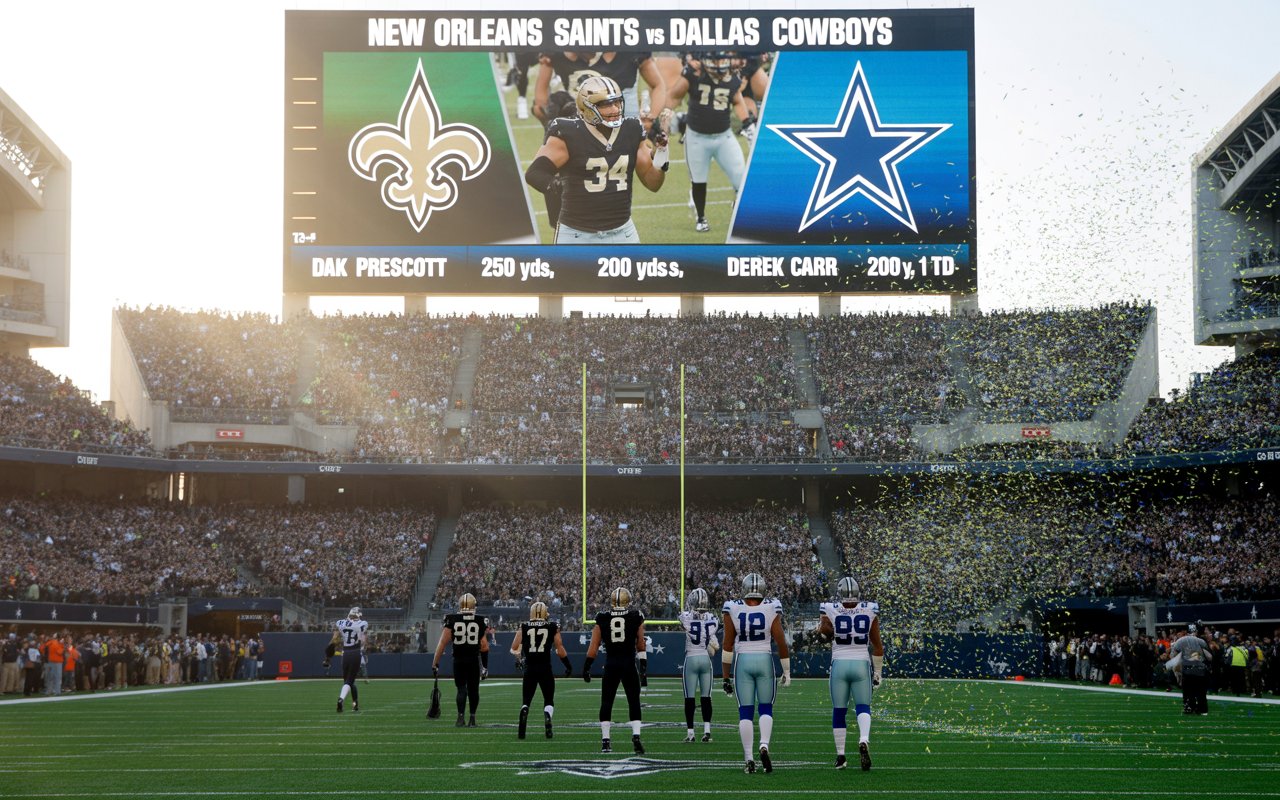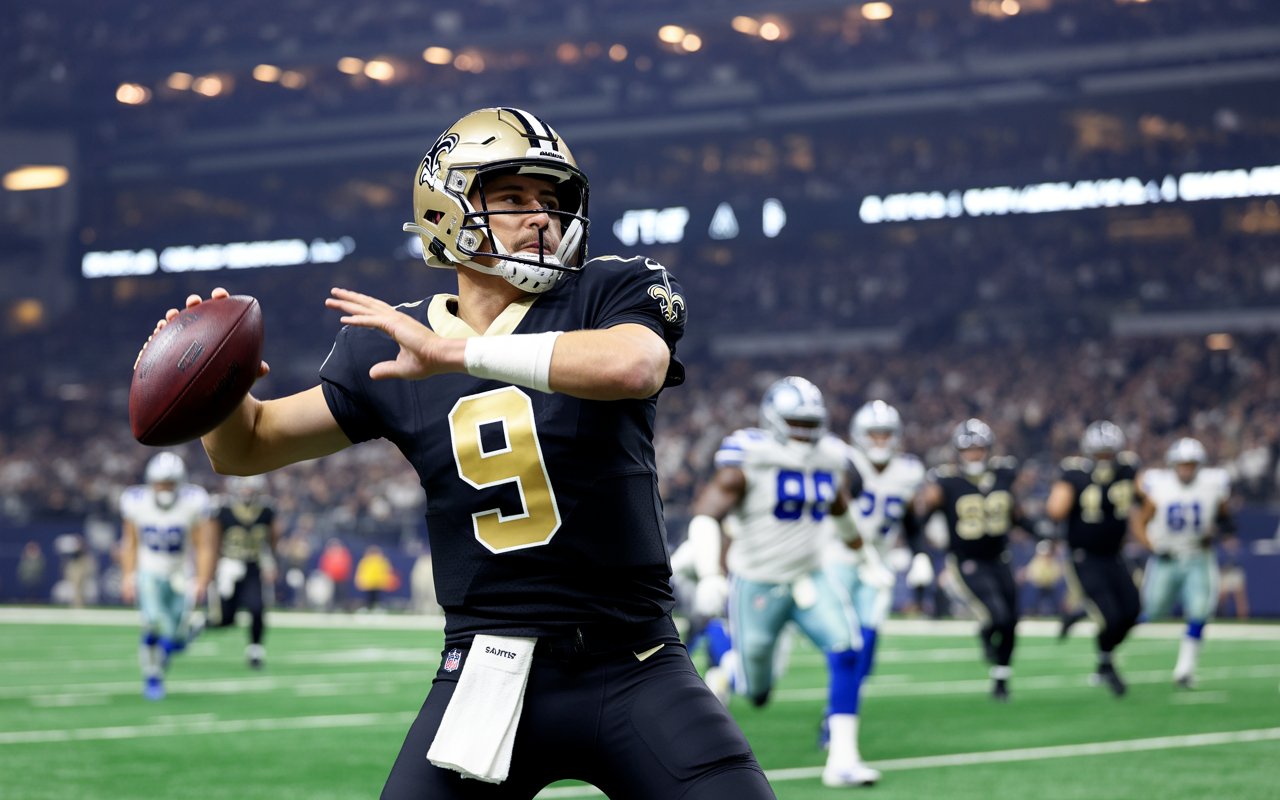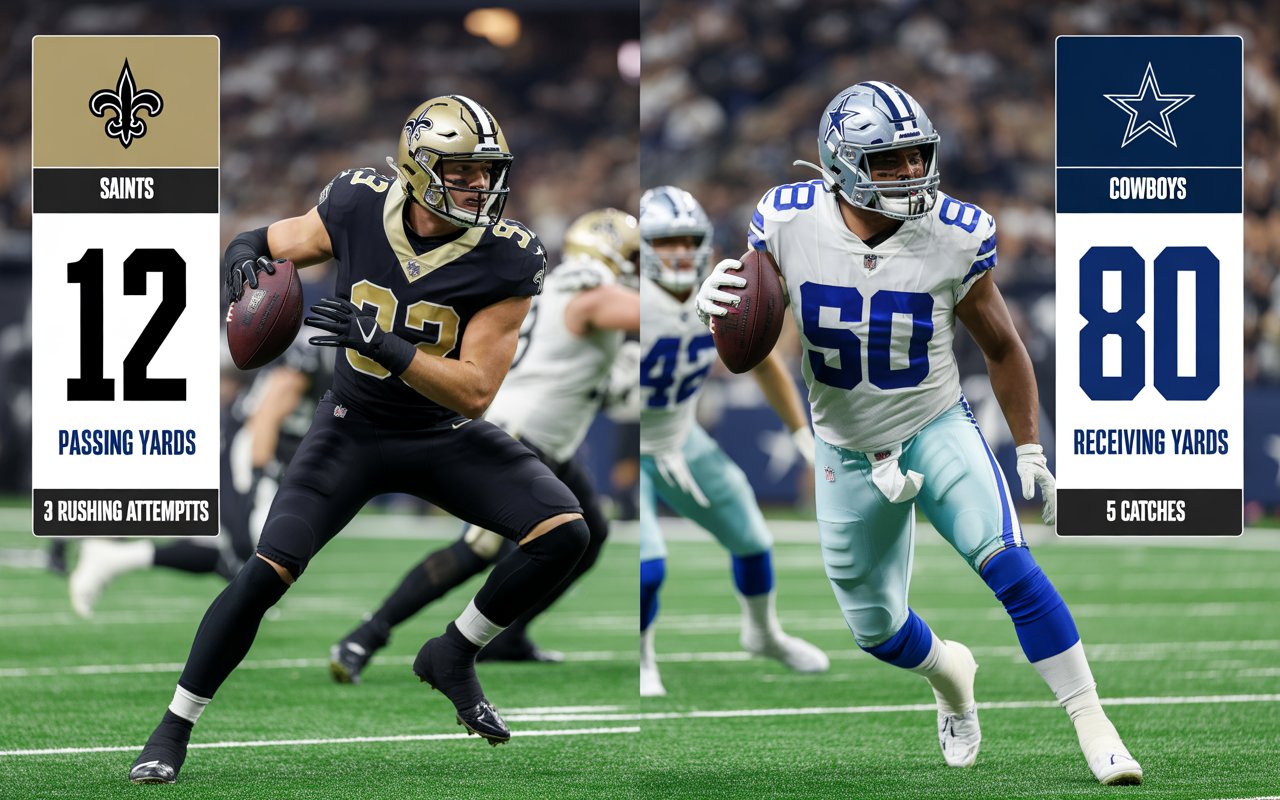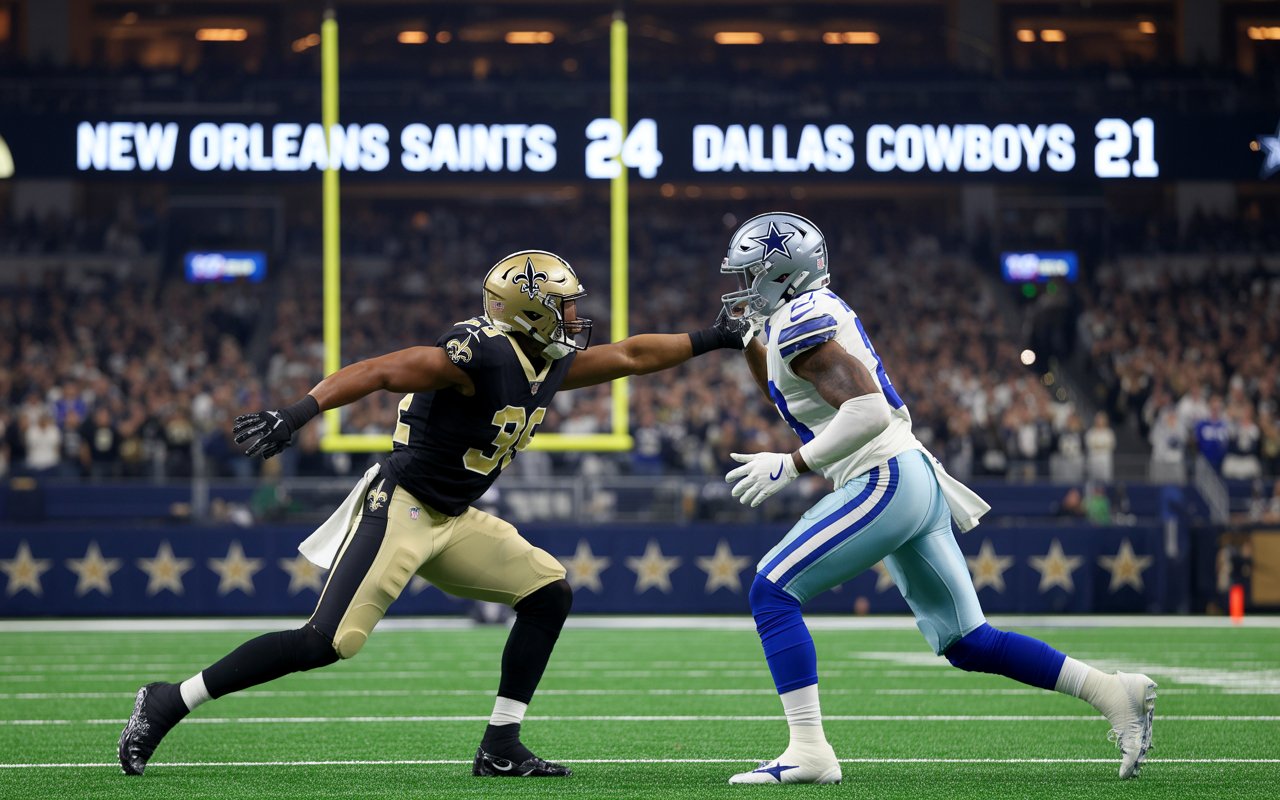When the New Orleans Saints go head-to-head with the Dallas Cowboys, it’s never just another game. These two franchises carry decades of history, passionate fan bases, and rosters stacked with star talent. Whether you’re a casual viewer, a fantasy football player, or a die-hard fan, player stats from these matchups always make for compelling conversations.
In this article, we’ll take a deep dive into the Saints vs Cowboys clash, unpacking the most important numbers, highlighting standout performers, and exploring what those stats mean in plain English. Think of this as your ultimate guide to understanding the story behind the numbers.
The Longstanding Rivalry Between Saints and Cowboys
Football rivalries aren’t just about geography. In the case of New Orleans and Dallas, it’s about pride, tradition, and the clash of two iconic southern teams. These games often carry playoff implications, making every stat line more significant.
For fans, it feels like a chess match — each move carefully countered by the other. The rivalry has also been marked by memorable quarterback duels, late-game heroics, and defensive showcases.
Quarterback Battle: Passing Numbers That Matter
In today’s NFL, quarterback performance often decides the outcome. For the Cowboys, Dak Prescott has been the leader, showing off his ability to command the offense with both his arm and legs. On the Saints’ side, the quarterback carousel in recent years has made things unpredictable, but big plays still come when needed.
Key Stats to Watch:
- Completion percentage shows accuracy.
- Yards per attempt indicates efficiency.
- Touchdowns vs interceptions highlight decision-making.
When Prescott gets into rhythm, Dallas moves the ball effortlessly. The Saints rely more on balancing the passing game with ground attack, especially when quarterbacks need extra support.
Rushing Attack: Running Backs in the Spotlight

Few positions capture fans’ attention like running backs. For Dallas, Ezekiel Elliott (in previous seasons) and now Tony Pollard have been game changers. Their ability to find holes and gain yards after contact keeps defenses on their heels.
For the Saints, Alvin Kamara is the heartbeat of the offense. His dual-threat ability as both a runner and receiver makes him one of the most versatile backs in the league.
Why rushing stats matter:
- Yards per carry show consistency.
- Explosive runs (10+ yards) reveal game-breaking potential.
- Red zone efficiency can make or break a drive.
When Pollard and Kamara are cooking, fans know they’re in for highlight-reel moments.
Wide Receiver Showdown: Big Plays on the Outside
What’s football without jaw-dropping catches? Both teams feature wideouts who can stretch the field and keep defenses honest.
- Dallas Cowboys: CeeDee Lamb has quickly become a household name, consistently producing big numbers in receptions and yards. His route running and ability to beat coverage make him a nightmare matchup.
- New Orleans Saints: Michael Thomas, when healthy, is known for his reliable hands and chain-moving ability. Alongside emerging talents like Chris Olave, the Saints’ air attack has balance and flair.
Important metrics:
- Targets and receptions (volume).
- Yards after catch (extra effort).
- Third-down conversions (clutch factor).
Every catch feels like a statement, especially in a tight game.
Tight Ends: The Unsung Heroes
While they don’t always get the spotlight, tight ends often tip the scales. Dallas has leaned on Dalton Schultz in past matchups for dependable short-yardage gains and red zone targets. The Saints, meanwhile, rotate their tight ends for both blocking support and surprise passes.
Why they matter:
- They’re the safety valve for quarterbacks.
- They create mismatches against linebackers.
- Their blocking helps set up big rushing plays.
When the tight ends get rolling, both offenses become far harder to stop.
Defensive Front: Pressure and Sacks

Games aren’t just won on offense. The defensive lines of both teams pride themselves on creating havoc.
- Dallas Cowboys: Micah Parsons is a game-wrecker, leading the charge with speed, strength, and versatility. His sack numbers tell only part of the story — his presence alone changes how offenses line up.
- New Orleans Saints: Cameron Jordan continues to be a force, using experience and technique to collapse pockets and disrupt timing.
Defensive stats to note:
- Sacks and pressures.
- Tackles for loss.
- QB hits.
If either defense gets consistent pressure, turnovers and short drives usually follow.
Secondary Showdowns: Interceptions and Pass Breakups
Cornerbacks and safeties often decide how much freedom opposing quarterbacks have. Dallas’ Trevon Diggs has become known for his ball-hawking ability, while the Saints’ Marshon Lattimore is a lockdown corner who thrives against top receivers.
These matchups aren’t just about interceptions; pass breakups, tackles, and overall coverage discipline all tell the story. A single defensive play in the secondary can swing momentum instantly.
Special Teams: The Forgotten Stat Lines
It’s easy to overlook kickers and return units, but they often change the outcome. Field goals, punt averages, and kickoff returns can give either team an edge.
Think of special teams like the glue of a football team — not always flashy, but essential. A missed kick or a big return can tilt momentum as much as a touchdown.
Coaching Decisions Reflected in the Numbers

Stats don’t just happen; they’re the result of coaching strategy. Dallas tends to lean on aggressive passing and defensive pressure, while New Orleans emphasizes balance and ball control.
Play-calling tendencies show up in third-down attempts, run-pass ratios, and time of possession. Every box score is a blueprint of how each coach approaches the game.
Historical Matchup Stats
Looking back at past Saints vs Cowboys games, patterns emerge. Some years, defenses dominated. Other times, offensive explosions lit up the scoreboard. Tracking average points per game, turnovers, and yardage totals across these meetings helps fans anticipate what might come next.
History doesn’t predict the future perfectly, but it sets the stage for expectations.
Fantasy Football Perspective
For fantasy managers, Saints vs Cowboys games are gold mines. Kamara’s receptions, Lamb’s deep catches, or Prescott’s passing yards can decide weekly matchups. Defensive stats like sacks and turnovers also boost fantasy scoring.
Understanding these player stats helps fans not only enjoy the game but also make smarter fantasy lineup choices.
The Human Element Behind the Numbers
While stats paint the picture, the emotion, grit, and determination behind each play are what make the game truly special. Think of the numbers as the notes in a song — important, yes, but it’s the rhythm and passion that bring them to life.
When a player pushes through an injury, or when a rookie makes a breakout play, those moments go beyond the stat sheet. They’re what keep fans glued to their screens.
Conclusion
The clash between the New Orleans Saints and Dallas Cowboys is about more than just a scoreline. It’s about the performances, the stats, and the stories those numbers tell. From quarterbacks launching bombs to defenders shutting down drives, every player stat adds another layer to the drama.
Next time you watch these two teams face off, you’ll know exactly what the numbers mean — and why they matter.
FAQs
1. Who usually has the edge when the Saints play the Cowboys?
It depends on the year. Some matchups favor the Saints’ defense, while others highlight the Cowboys’ offensive firepower. Historically, the Cowboys have won more, but the Saints often play spoiler.
2. Which player tends to shine the most in these games?
Alvin Kamara and CeeDee Lamb often put up standout performances. On defense, Micah Parsons and Marshon Lattimore are names to watch.
3. How do player stats affect playoff chances?
Strong individual performances can turn into wins, and wins directly affect playoff positioning. Stats like turnovers and third-down conversions often separate playoff-bound teams from the rest.
4. Do special teams play a big role in this matchup?
Absolutely. A field goal or a long return can swing momentum. Special teams often go unnoticed, but they’re vital in close contests.
5. Why should casual fans care about player stats?
Because stats tell the story behind the game. They show who’s making an impact, how strategies are working, and what’s really happening beyond the score.













